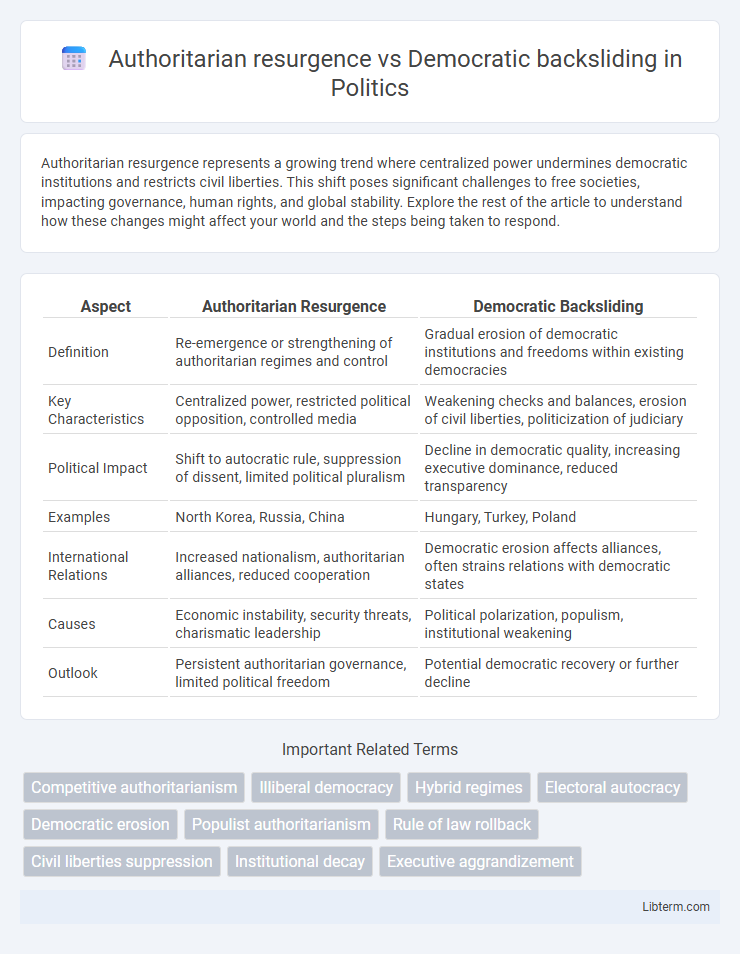Authoritarian resurgence represents a growing trend where centralized power undermines democratic institutions and restricts civil liberties. This shift poses significant challenges to free societies, impacting governance, human rights, and global stability. Explore the rest of the article to understand how these changes might affect your world and the steps being taken to respond.
Table of Comparison
| Aspect | Authoritarian Resurgence | Democratic Backsliding |
|---|---|---|
| Definition | Re-emergence or strengthening of authoritarian regimes and control | Gradual erosion of democratic institutions and freedoms within existing democracies |
| Key Characteristics | Centralized power, restricted political opposition, controlled media | Weakening checks and balances, erosion of civil liberties, politicization of judiciary |
| Political Impact | Shift to autocratic rule, suppression of dissent, limited political pluralism | Decline in democratic quality, increasing executive dominance, reduced transparency |
| Examples | North Korea, Russia, China | Hungary, Turkey, Poland |
| International Relations | Increased nationalism, authoritarian alliances, reduced cooperation | Democratic erosion affects alliances, often strains relations with democratic states |
| Causes | Economic instability, security threats, charismatic leadership | Political polarization, populism, institutional weakening |
| Outlook | Persistent authoritarian governance, limited political freedom | Potential democratic recovery or further decline |
Understanding Authoritarian Resurgence
Authoritarian resurgence refers to the revival and strengthening of autocratic regimes, characterized by centralized power, reduced political freedoms, and weakened institutional checks. This phenomenon often stems from economic instability, social fragmentation, and ineffective governance that undermine democratic norms and institutions. Understanding authoritarian resurgence requires analyzing how ruling elites manipulate legal frameworks, control media, and suppress opposition to consolidate power and erode democratic accountability.
Defining Democratic Backsliding
Democratic backsliding refers to the gradual decline in the quality of democracy through the erosion of civil liberties, weakening of judicial independence, and undermining of electoral integrity. This process often includes the concentration of executive power, restrictions on press freedom, and the curtailing of political opposition. Unlike authoritarian resurgence, which entails outright regime change to authoritarianism, democratic backsliding occurs within ostensibly democratic systems that experience progressive authoritarian features.
Key Drivers of Authoritarianism’s Global Comeback
Rising authoritarianism worldwide is driven by factors such as economic inequality, weakening democratic institutions, and strategic use of technology for surveillance and propaganda. Autocratic regimes exploit nationalist sentiments and fears of instability to consolidate power while undermining checks and balances. Global geopolitical shifts, including the influence of authoritarian powers challenging liberal democracies, further accelerate the resurgence of authoritarianism.
Indicators and Warning Signs of Democratic Erosion
Sharp declines in free press, increasing executive overreach, and erosion of judicial independence serve as primary indicators of democratic backsliding. Rising political polarization coupled with manipulation of electoral processes often signal authoritarian resurgence under a democratic guise. Monitoring civil liberties restrictions and declining public trust in institutions provides early warning signs critical for preventing democratic erosion.
Case Studies: Countries Facing Authoritarian Resurgence
Countries experiencing authoritarian resurgence, such as Russia, Turkey, and Hungary, demonstrate a reversal of democratic norms through concentrated executive power, weakened judicial independence, and restricted media freedoms. In Russia, Vladimir Putin's administration has intensified political control by suppressing opposition and manipulating electoral processes, eroding liberal democratic institutions. Turkey under Recep Tayyip Erdogan has similarly curtailed civil liberties and institutional checks, while Hungary's Viktor Orban has systematically reshaped constitutional frameworks to entrench authority, highlighting key case studies of authoritarian resurgence undermining global democracy.
Comparative Analysis: Successful Democracies vs. Failing Ones
Successful democracies maintain robust institutions, transparent governance, and active civil societies that resist authoritarian resurgence, while failing democracies exhibit weakened checks and balances, corruption, and erosion of rule of law. Comparative analysis reveals that countries with higher levels of political participation and independent judiciary systems demonstrate greater resilience against democratic backsliding. Data from the V-Dem Institute illustrate that democratic erosion correlates strongly with declining media freedom and concentrated executive power in failing democratic states.
The Role of Technology in Empowering Authoritarian Regimes
The role of technology in empowering authoritarian regimes is evident through advanced surveillance systems, internet censorship, and AI-driven propaganda tools that suppress dissent and manipulate public opinion. Authoritarian governments increasingly deploy facial recognition, data analytics, and social media monitoring to monitor citizens and preempt opposition movements. These technological capabilities contribute significantly to authoritarian resurgence by strengthening state control while simultaneously undermining democratic resilience and eroding civil liberties.
Civil Society and Media: Defending Democracy Amid Decline
Civil society organizations and independent media serve as critical bulwarks against authoritarian resurgence and democratic backsliding by promoting transparency, accountability, and civic engagement. Strengthening press freedom and protecting non-governmental organizations enable citizens to resist coercive state actions and misinformation campaigns. Sustained support for these democratic institutions is essential to preserve pluralism and prevent the erosion of democratic norms worldwide.
International Responses to Authoritarian and Democratic Shifts
International responses to authoritarian resurgence often include targeted sanctions, diplomatic isolation, and support for civil society organizations to counterbalance regime consolidation. In contrast, democratic backsliding triggers a combination of electoral assistance, monitoring missions, and pressure from multilateral institutions aimed at restoring democratic norms. Both phenomena prompt tailored foreign policies that reflect geopolitical interests and the strategic value of promoting or containing governance shifts globally.
Future Scenarios: Reversing the Global Trend
Future scenarios for reversing authoritarian resurgence and democratic backsliding emphasize strengthening civil society institutions and enhancing electoral integrity through robust legal frameworks and independent oversight bodies. Advanced technologies like blockchain-based voting systems and AI-driven transparency tools could increase accountability and reduce election fraud, fostering public trust in democratic processes. International cooperation and targeted sanctions against authoritarian regimes may incentivize democratic reforms and support grassroots movements advocating for political freedoms worldwide.
Authoritarian resurgence Infographic

 libterm.com
libterm.com